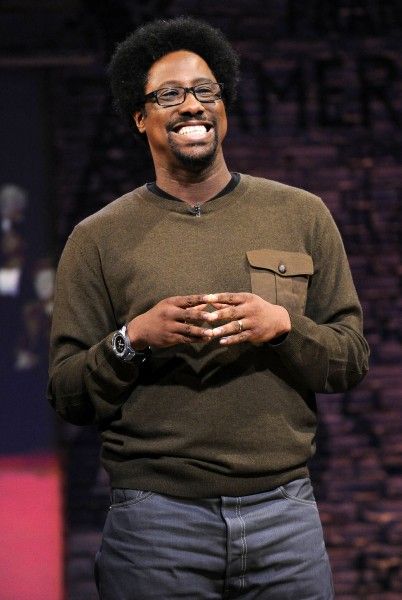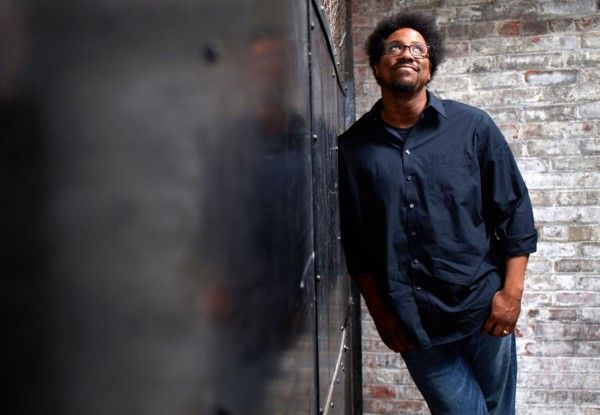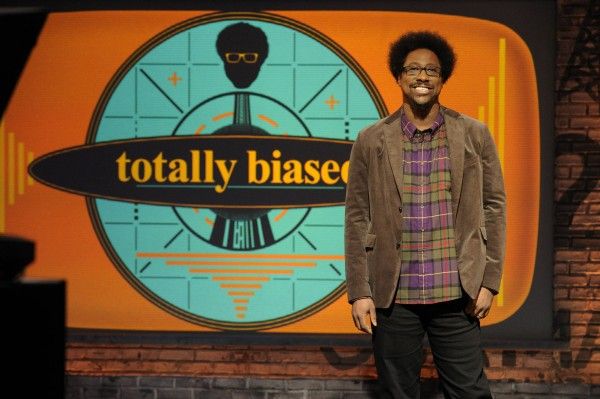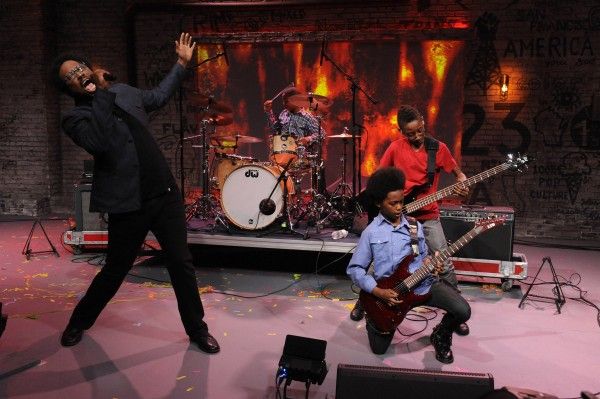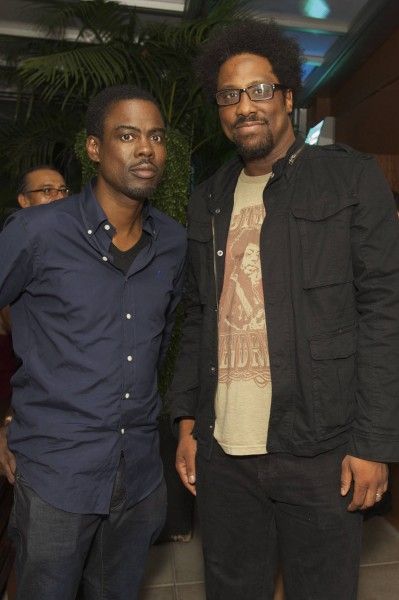Totally Biased with W. Kamau Bell, now airing week nights on FXX, gives the stand-up comedian a platform to hilariously dissect politics, pop culture, race, religion, sex and the media, as only he can. Through a combination of commentary, live guests, sketch comedy and taped segments, he always has a unique and honest point of view.
During this recent exclusive interview with Collider, funnyman W. Kamau Bell talked about finding the groove of the show, what he felt most insecure about when he started, wanting to do his job better and more effectively for the new season and the new network, how his recent live tour has affected things, which guest he’d most like to have on and what he’d like to discuss with them, what he’s most biased about and what he’s totally unbiased about, why social media is beneficial to comedians, and how Chris Rock (who executive produces his show) has most influenced him. Check out what he had to say after the jump.
Collider: With any new TV show, it takes a little bit of time to find your groove, but Totally Biased seemed to really know what it was, right out of the gate. Did it feel that way for you, at all?
W. KAMAU BELL: Well, I appreciate that ‘cause, from the inside, it didn’t feel that way. I still feel like we’re getting a groove, but we have to keep digging deeper and deeper. When I watch [Jon] Stewart, that groove is so deep that he can blink and people go crazy, just ‘cause they have a history with him. I feel like we’re trying to get to that place. Comedy is like expensive cheese. Well, it’s like cheese, in general. Everybody likes what they like, and everything they don’t like, they think is the worst. Some people are fine with Velveeta, and some people are like, “You eat Velveeta!,” and comedy is the same way.
Were there things that you felt most unsure about, and were there things that you felt most secure in?
BELL: You know, I probably didn’t feel secure about any of it, when I started doing it. That’s how I operate. I think the insecurity is what keeps me going. I was really surprised at how quickly I was able to have jokes written for me and tell them, and then get laughs. I thought there would be some sort of learning curve for how to interpret other people’s words into my voice. There was no time to think about it, so it just happened and I was like, “Oh, okay, this is working. The audience is laughing from things I’m saying, when I didn’t necessarily write all of these words. I had input into all of them. I wouldn’t have thought of this punchline, but it’s working and it’s funny.” So, that was something that I was surprised about. At least the people in the studio were laughing at what I was saying. I felt like I was performing for them, and then hoping that America and the world, or wherever we broadcast FXX, picks up on it.
And then, when I started doing the “Man on the Street” pieces, I had never really done them before, so I was really tentative, and I can see that in the early pieces. Now, when I go out, I trust that we’re gonna figure it out. A lot of it happens in the edit, and when somebody is not being okay, I can move them along. One of my favorite things that we’ve ever done on the show is the piece, “Anything You Want to Say to a White Guy,” where we talked to people about racism, and then had them say stuff to a white guy. It was just this beautiful, lyrical piece that we did, that was really funny, but also felt sweet, at its core. To me, that’s one of the places that Totally Biased lives. We clearly care about the issue, but we’re attacking it in a way that’s not divisive and that brings people together.
It’s great that you find people who really want to talk and you let them talk, instead of just showcasing how stupid they are.
BELL: And we let them say their interesting thing, we just sometimes couch it in a way that gets us a little humor out of it. In “Anything You Want to Say to a White Guy,” that guy at the end went on this long rant about the history of racism from his perspective, and when it was happening, at the time, I was like, “Man, we are not going to use any of this.” But then, when we got in the edit, it was like, “Oh, no, we can actually frame it in a way where he gets to make his point and we get to get a laugh out of it, and somebody at home will go, ‘I never knew about all that stuff.’” For me, you wrap it up in a joke. That guy gets to watch it on TV and feel good about what was done with him. I believe that anytime anybody has looked bad on a “Man on the Street” piece, it’s because they leaned into it.
Did you feel any pressure for helping launch FXX?
BELL: In the bigger scheme of things, I’m in the John Landgraf army. John Landgraf is the general, and I’m just one of the infantry, being told where to go. I’m storming the beaches with FXX now. If that’s where I’m supposed to go, then that’s where I’m supposed to go. I don’t think of it as me launching the network. I think of it as me just doing my job better and more effectively. We’re five days a week now, so we had to get stronger and faster with it. If we do a good job with the show, then that will launch the network. I didn’t feel like we had to do something different. I want to get better, anyway.
Having one season behind you, and then doing a live tour, did it affect how you approached things this season?
BELL: We did this live tour, and I’ve always noticed that there are differences about how I’m on stage as a stand-up that I haven’t been able to figure out how to do on Totally Biased. We did a show, here in L.A. at Largo, and Eric Schrier, who’s one of the presidents of the network, came to the show and said, “You’re more physical on stage than you are on Totally Biased.” On Totally Biased, I’m standing on a mark, and he said, “We need to figure out how to do that.” Coming into this, they thought, “Oh, he’s a late-night talk-show host.” Now, they really see, “Oh, he’s a comedian first, and a late-night talk-show host second. Let’s figure out how to get the things he does in stand-up into Totally Biased.” We’re gonna work harder to fully round out my performance on Totally Biased, in a way that’s not always me standing stock-still, talking into the camera. I think Totally Biased has reflected, in a good way, that I’m ultimately just a goofball on the inside. Anything we can do to show that I’m really just a dork is better for the show.
It’s great that you even crack yourself up sometimes.
BELL: Not everybody likes that! It’s not really a purposeful thing. Some things just strike me as funny. The way things play out just makes me laugh sometimes. It drives my wife crazy sometimes because I’ll just be laughing for no reason. Especially when the show started, I spent a lot of time around the office just laughing to myself. I was like, “This is crazy, right?! This is not supposed to be happening.” And they would be like, “You are a good comedian. You’ve worked hard for this.” I’d be like, “Just tell me it’s crazy!,” and they’d say, “It’s crazy!,” and I’d be like, “Okay, now I can get back to work.”
How do you feel you’ve changed and grown, having a season of the show under your belt?
BELL: Well, I used to think it was crazy, and now I realize that it’s my job. At first, there’s a little bit of feeling like a contest winner. For the first few episodes, it was like, “This is your house,” and I’d be like, “This is my house!” I couldn’t really accept the fact that this was my stuff. And then, as the show went on, like when we did the Lindy West thing, that was me owning the show and going, “I want to do this. I’ve never seen this done before. I wanna do it. We’re doing it. Do you think it’s a good idea?” You still have to sell the idea. But, that was me, clearly owning the show. The more that I own the show with ideas that I want, the more totally biased the show will be.
Who is the guest that you would most like to have, and what would you want to talk to them about?
BELL: I’ve said this before, and people think it’s weird, but I really do want to have Denzel Washington on. Denzel Washington is the last black actor in Hollywood who had to represent the race, in a very profound way. Sidney Poitier literally passed the baton to him, and now Denzel is still holding on to the baton. Maybe he doesn’t need to pass it on, but I think we still need some of that. I really feel like there’s a very profound discussion to be had with him about the pressure to be that black guy who can never end up on TMZ. He has to always be talking about his marriage and how he goes to church on Sundays because he’s a standard of blackness. He’s a unit of blackness. You can be Denzel, or lesser than Denzel. So, I think there’s a conversation to be had with him about that, that I haven’t seen him have. Maybe he doesn’t want to have that conversation, but I certainly feel like he’s actively embedded in putting forth the best version of blackness possible. As a person who has always had to be aware of my race at all times, he’s been an example of how to do it. I’d really like to have that conversation with him, so we’ll see what happens. Or we can just talk about his next movie. That would be fun, too.
You cover a lot of really interesting and varied topics on the show. Is it important to you to know both sides of whatever topics you discuss?
BELL: Yeah. When we fail on Totally Biased is when we get too much like, “Republicans are stupid!” We haven’t done a lot of that, but we’ve done some of that, where you’re hitting the low-hanging fruit. For me, the best version of that is when you can get to an issue where, at some point, you’re not firmly on one side or the other, and you can see both sides. So, when you do want to go at somebody directly, like Todd Akin, you can be like, “This guy is an idiot!” You’re not always calling people idiots. You reserve that for when someone really is an idiot. The more we become less about the parties and more about the issues, the more successful we are.
What would you say you’re most biased about, and are there times when you’re totally unbiased?
BELL: I would say that I’m most biased about how, right now, white people have to learn to shut up when the conversation of racism comes up. White people have to learn to listen. Whether they agree with what they’re hearing or not, they have to know to shut up and listen. You might not agree with it, but it doesn’t mean you don’t need to listen to it. White people have to accept that they don’t always know about racism. As a person of color, you’re in a PhD level racism class, every day. Every day, I’m in a deep racism seminar. And I’m not saying that white people aren’t taking that class, but they don’t show up that often and they’re auditing it. And then, when they do show up, they’re like, “I know the answer!” I’m totally biased about that. Nobody can talk me out of the fact that white people need to just listen.
What am I unbiased about? Let’s see. I don’t think about being unbiased, at all. With the entertainment industry, there was a point at which I felt like I had to be not only pro-myself but anti-others. I’ve learned that we don’t all have to agree on the same version of things we take into our head. Everybody’s pleasure is a guilty pleasure, on some level. You’re not smarter ‘cause you watch Downton Abbey, and you’re not dumber ‘cause you watch Duck Dynasty. Guess what? I watch both. There’s an elitism that comes out with the entertainment industry. I’ll talk about those shows, but I’m not gonna say that you’re dumb for watching one over the other. I just let it go. I don’t have to declare a fatwa on any of these things. I can go, “Well, I don’t watch that, but I also watch things that you don’t watch.” I’ve gotten over some of my elitism. It takes things to a space where you think you’re cool because you don’t like Honey Boo Boo. Why does that make you cool? Why does that make you better? That’s something that I’ve really given up my biased opinions on.
Do you feel that social media is beneficial to a comedian, or do you ever have to catch yourself sharing too many jokes?
BELL: I feel like you can share as many jokes as you want to because no joke you do on Twitter is ever gonna be so big on Twitter, for the most part, that you can’t say it on stage that same night. That’s a small percentage of the Populus. I think Twitter is a great place to share jokes. Before Totally Biased, there was a point with my Facebook page where I was like, “Oh, I can’t really post pictures of my daughter here anymore ‘cause some of these people are assholes. I can’t really have my wife’s name on my Facebook page ‘cause some of these people are assholes.” You can see that I’m married, but not who I’m married to, and I have to go to her Facebook page to see pictures of my daughter, or look at my phone. You do have to close off a little bit ‘cause social media can be a multi-headed Hydra that’s biting you and biting itself.
How has Chris Rock most influenced and inspired you, in your career?
BELL: He’s really gone out of his way to be helpful, and he always says that I can call him anytime, if I need advice. But his best thing is, “Don’t get caught up in your attack on the issues. Get caught up in making that stuff funny. Don’t think you’re so righteous that it doesn’t have to be funny. Make it funny.” He constantly rings that bell. You have to be a comedian. You can’t just be run. Because I’m from the Bay Area, I have gotten caught up in the being right thing, but I’ve finally heard it. We have to be funny, and then the right just sneaks in.
Totally Biased airs on weeknights on FXX.


